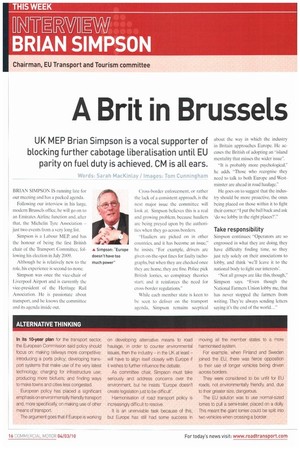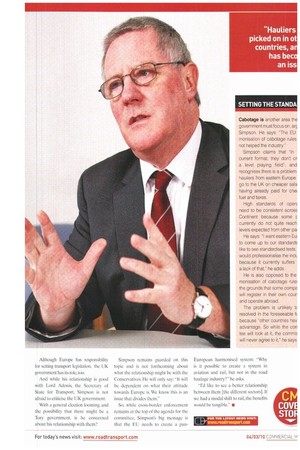A Brit in Brussels
Page 16

Page 17

If you've noticed an error in this article please click here to report it so we can fix it.
UK MEP Brian Simpson is a vocal supporter of blocking further cabotage liberalisation until EU parity on fuel duty is achieved. CM is all. ears.
Words: Sarah MacKmiay / images: Tom Cunningham
I3RIAN SIMPSON IS running late for our meeting and has a packed agenda.
Following our interview in his large. modern Brussels office, he will go on to an Emirates Airline function and, after that, the Michelin Tyre Association — just two events from a very long list.
Simpson is a Labour MEP. and has • the honour of being the first British
chair of the Transport Committee. folA Simpson: -Europe lowing his election in July 2009. doesn't have too Although he is relatively new to the much power'
role, his experience is second-to-none.
Simpson was once the vice-chair of Liverpool Airport and is currently the vice-president of the Heritage Rail Association. He is passionate about transport, and he knows the committee and its agenda inside out. Cross-border enforcement, or rather the lack of a consistent approach, is the next major issue the committee will look at. Simpson believes this is a real and growing problem, because hauliers are being preyed upon by the authorities when they go across borders.
"Hauliers are picked on in other countries, and it has become an issue," he insists. "For example, drivers are given on-the-spot fines for faulty tachographs, but when they are checked once they arc home, they are fine. Police pick British lorries, Sc) conspiracy theories start; and it reinforces the need for cross-border regulations."
While each member state is keen to be seen to deliver on the transport agenda. Simpson remains sceptical
about the way in which the industry in Britain approaches Europe. He accuses the British of adopting an "island mentality that misses the wider issue".
"It is probably more psychological." he adds. "Those who recognise they need to talk to both Europe and Westminster are ahead in road haulage."
He goes on to suggest that the industry should be more proactive, the onus being placed on those within it to fight their corner:"1 put the ball back and ask 'do we lobby in the right places?'."
Take responsibiLity
Simpson continues: "Operators are so engrossed in what they are doing, they have difficulty finding time, so they just rely solely on their associations to lobby, and think 'we'll leave it to the national body to fight our interests'.
-Not all groups are like this, though," Simpson says. "Even though the National Farmers Union lobby me. that has never stopped the farmers from writing. They're always sending letters saying it's the end of the world..."
Although Europe has responsibility for setting transport legislation. the UK government has its role, too.
And while his relationship is good with Lord Adonis. the Secretary of State for Transport. Simpson is not afraid to criticise the III< government.
With a general election looming, and the possibility that there might be a Tory government, is he concerned about his relationship with them?
Simpson remains guarded on this topic and is not forthcoming about what the relationship might be with the Conservatives. He will only say: -It will be dependent on what their attitude towards Europe is. We know this is an issue that divides them."
So, while cross-border enforcement remains at the top of the agenda for the committee, Simpson's big message is that the EC needs to create a pan European harmonised system: "Why is it possible to create a system in aviation and rail, but not in the road haulage industry?" he asks.
"I'd like to see a better relationship between them [the different sectors]. If we had a modal shift to rail, the benefits would be tangible." •
































































































































